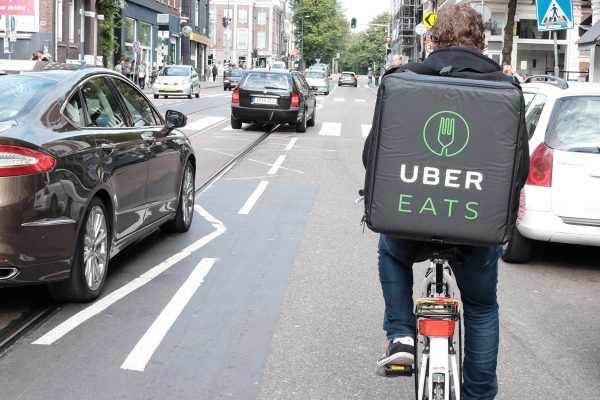
Facing pay cuts, infections, and even greater precarity, Uber workers have faced some of the worst of COVID-19.
But the recently announced “National Agreement” between Uber and the United Food and Commercial Workers (UFCW)—which would see the two lobby together to advance a “common” agenda over the heads of Uber workers—offers little in the way of a solution.
‘It’s Getting Worse’
In June 2019, UFCW announced that hundreds of Toronto Uber workers had signed union cards. A few months later, in early 2020, Uber Black drivers filed for a union vote.
With the onset of the pandemic, work for Uber has become more precarious, more dangerous, and worse-paying. Some Uber couriers and drivers have seen their earnings fall to just $7 per hour. One courier told the Canadian Press: “I’m making so little now that I’m thinking what is the point of even getting out there if I’m just going to make this much and it’s getting worse?”
Classified as “independent contractors”, Uber workers are denied minimum wage protections, most health and safety standards, and the recognized collective bargaining process. Far from an oversight, Uber actually warns its shareholders that if its workers had rights, “expenses associated with the application of wage and hour laws” would shrink their returns.
Despite worsening conditions, the UFCW campaign had been mostly quiet since early 2020. Then, on Jan. 27, 2022, UFCW announced an “historic national agreement” with Uber to give 100,000 Uber workers “access to representation.” The union’s press release quotes Andrew Macdonald, Uber’s VP of Global Rides and Platform, claiming:“In a quintessentially Canadian manner, we’ve come together to find common ground and blaze a new trail towards a better future for app-based workers.”
But, as The Globe and Mail clarified, the agreement does not significantly change Uber’s policies around pay or job security. The “National Agreement” also doesn’t unionize Uber’s workers, even though UFCW maintains they’re employees who have the right to a union.
The agreement offers workers who face “account deactivation” cost-free representation, “if requested,” from UFCW in a “third-party” dispute resolution process. The costs, according to the release, are to be covered by a fund paid jointly by the union and company. But in order to secure this fairly minor change, the union appears to have agreed to lobby alongside Uber for changes to employment standards law.
“Uber Canada and UFCW Canada have also agreed to press provincial governments to enact reforms that provide new benefits and preserve worker choice on when, where, and if to work. Uber Canada and UFCW Canada will jointly advocate for these industry-wide legislative standards – like minimum earnings standard, a benefits fund, and access to workers’ rights – across the country.”
While what the two will lobby for remains vague, the release curiously avoids words like “wage”, “employee”, “bargaining”, and “union.” This language of “worker choice,” further, is largely in keeping with Uber’s widely-mocked FlexibleWork+ proposal.
Dubbed “a Modern Approach to App-Based Work,” FlexibleWork+ promises to “help drivers and delivery people who earn through app-based work receive new benefits and protections—while still keeping the flexibility they value.” In reality, while offering a “self-directed” benefit fund, Uber’s proposed legislation would exclude its workers from Employment Standards protections and union rights, establishing a new underclass of “gig workers” in law.
The Canadian Union of Postal Workers (CUPW) warned that the language in this UFCW release could potentially even abrogate the rights of Uber workers who’ve already signed union cards. “Over the last year, Uber has made its goals very clear: they want to enshrine worker precarity into law,” CUPW said. “The UFCW-Uber agreement comes as a shock to those organizers, and in particular to the Uber Eats delivery workers who have signed cards with CUPW.”
Toronto UberEats courier Brice Sopher told CTV News that the whole agreement “is more so to give Uber the protection, the veneer of being progressive, while they will continue probably to push for the regressive rolling back of worker’s rights.”
No Road But To Fight
Uber has explicitly stated that its enormous profits depend on highly precarious, poverty-wage work. There can be no “common ground” between Uber’s owners and its workers. Gain for one is a loss for the other.
Yet, in pursuit of this mythical “common ground,” it appears that UFCW has endorsed a deeply regressive set of policies. Uber workers will not be significantly better off as a result of this “national agreement.”
Despite some setbacks, the Foodora union drive offers an instructive counter-example. With mass meetings, rallies, and direct appeals between workers (instead of between union officials and company heads) Toronto’s Foodora couriers got a sense of their own strength. The campaign not only alarmed other low-wage employers like A&W, but it even pushed the Ontario Labour Relations Board to override the company’s anti-worker policies.
The ongoing efforts of Gig Workers United, which in large part grew out of the Foodora union drive, has further expanded to help organize UberEats workers and others stand up for themselves.
Elsewhere, in the United States and Britain, Uber and Lyft strikes have also mobilized thousands of workers and their supporters for better pay and conditions. In neither case has fighting back guaranteed victory. But not fighting, as in this UFCW-Uber case, is a very effective way to guarantee defeat.

